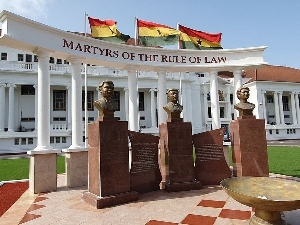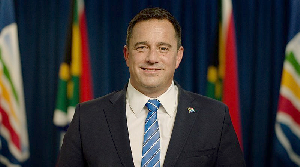Opinions of Thursday, 12 October 2023
Columnist: Evans Tetteh
Israel-Palestinian conflict and reinforcing global institutionalism
The genesis of one of the most protracted conflicts witnessed in the modern era could be traced to the Balfour Declaration (1917), if not the Genesis of the Bible.
On November 2, 1917, Arthur Balfour, then foreign secretary of Britain, addressed a letter to the British Jewish community committing the government
support to “establish in Palestine a national home for the Jewish people.”
Consequently, in the ensuing three decades or so from that time, the European power expedited mass Jewish migration for the Zionists as they fled Nazism and other forms of alienation in Europe to settle in Palestine.
Certainly, the colonially-orchestrated settlement did not only create discomfort for the resident Palestinians, they felt that they were unfairly robbed of their lands and space handed over to the Jews, eventually leading to repressions and loss of rights.
The geopolitical impasse since 1936, axiomatically made worse by the official founding of Israel in 1948, resulted in incessant clashes, revolts, acts of war, and wars – delineated the Israel-Palestinian conflict.
The loss of lives, humanitarian crises, destruction of infrastructural facilities, harm to the environment, and the financial burden have triggered significant pain in the neck for global security and international relations.
For example, The Economist has estimated that about 14,000 lives have been lost between 1987 and 2021 intervening period.
Just yesterweek, the conflict took a new gloomy prognosis when Palestinian militant group Hamas carried out a well-planned and coordinated attack on Israel with an unprecedented single-day casualty like never before happening in Israel.
As could be expected, following that cataclysmic attack, Israel declared a full-scale war with “Operation Swords of Iron,” and likely to become one of the most disastrous encounters between the two in the 21st century.
Already, within 5 days the war has reportedly claimed more than 2200 lives from both sides with fast-deteriorating social and economic repercussions.
In a general view of the situation, the antecedents as well as the recent development which is worrying but also inform the need to focus more on the appropriate course of action and not who is historically wrong or right.
Admitted, before the Balfour Declaration, Palestinians rightfully occupied the space. A deeper delve, however, begs for questions such as; where was the original home of the Jews before they were conquered and scattered abroad? If there was the genuine sine qua non, albeit arguably, for the Jews to be gathered to their original inheritance, where could that have contemplatively been?
Those questions perhaps transcend beyond simple answers with likely tantalizing political, cultural, and even religious biases.
Under the current irksome circumstances, the valid argument should extend beyond who owns or owns not the territory, but rather the disproportionate unfairness in resource distribution, asymmetrical protection of human rights, extraneous political meddling, and most conspicuously the shortfalls of the United Nations (UN) to deliver its mandate “to establish conditions under which justice and respect for the obligations arising from treaties and other sources of international law can be maintained.”
Principally the structures of the UN, all the more the Security Council have been bemused by ideologically driven individual state interests to the extent that in some cases as the one in hand, it could hardly work in concert, maintain the rules fairly, or crack the whip as the head international watchdog to find
solutions to such a long-standing inter-territorial conundrum.
In this instance, the UN is failing the world by not congruously discharging its liberal institutionalism role through the enhancement of mutual trust and enforcing norms, regimes, and institutions. Without a possible reform or effective discharge of the UN’s supranational ethos, the conflict is not likely to be fairly resolved anytime soon.
Indeed, “anarchy is what states make of it.” Territorial integrity is paramount to every state but ought to be exercised in a way that does not infringe on another territory’s right to exist. Without any stronger mediating authority as urgently required for the conflict, both sides would continue to perceive each
other as a threat to their sovereignty due to the diverging identities and limited shared interests, with rebutting attacks.
In the long term, cooperation could be achieved if global institutionalism is expended judiciously to some extent aligning the interests and identities with common global goals as opposed to hegemonic pursuits by some individual states.
In conclusion, “peace is not the absence of conflict; it is the ability to handle conflict by peaceful means.”
The recent exacerbation of the Israel-Palestinian conflict tests the pertinacity of the comity of nations to trigger multilateral mechanisms for a peaceful resolution.
It behooves global leaders and the good faith of the world’s most powerful nations to either reinforce or refine institutional frameworks especially through the UN and its principal organs for a deserving solution. In doing so, the structures might in some respects serve as archetypes for tackling other equally worrying protracted, and devastating conflicts.













